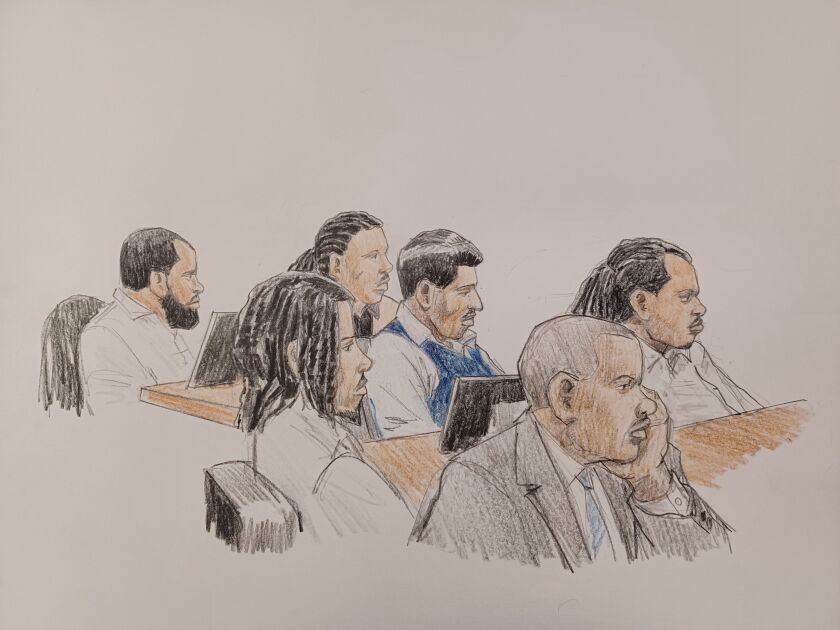Over the course of nearly 2,000 YouTube videos, Martell Wiley has always covered his face to discuss the often violent intersection of Chicago’s gang and rap cultures.
But Wiley ditched his signature mask Thursday and took the stand in the federal trial surrounding the brazen killing of rapper FBG Duck. In doing so, he revealed himself as a longtime government informant who’s been paid handsomely for his cooperation.
Speaking in quick bursts, Wiley cursed, cracked jokes and discussed his close connections to both the victim and defendants, some of whom he identified in surveillance footage.

Assistant U.S. Attorney Jason Julien (center) questions rap blogger Martell Wiley as Judge Martha Pacold watches during the federal trial surrounding the death of rapper FBG Duck.
L.D. Chukman
His tone and tenor closely resembled the videos he’s posted to his popular Trenches News YouTube channel, which he has repeatedly used to discuss the case.
“I’m Michael Jordan on YouTube,” Wiley boasted about the channel, which has about 114,000 subscribers.
During his testimony, he acknowledged that he reached out to law enforcement and offered to help shortly after FBG Duck — whose real name is Carlton Weekly — was gunned down in the Gold Coast neighborhood on Aug. 4, 2020. He noted that he was close friends with Duck’s slain brother and described Duck as “one of the coolest, smoothest dudes.
“And that’s why I’m here today — for him,” said Wiley, who greeted Duck’s mother as he left the courtroom.
Wiley’s perspective on Duck’s death is unique, as he’s been affiliated with both gang factions at the heart of the case.
On trial are six members and associates of the O Block set of the Black Disciples: Marcus Smart, 24; Christopher Thomas, 24; Kenneth Roberson, 30; Charles Liggins, 32; Tacarlos Offerd, 32; and Ralph Turpin, 34.
Anchored to the Parkway Gardens housing complex at 64th Street and King Drive, O Block has been locked in a bitter, yearslong war with Duck’s Tookaville faction of the Gangster Disciples.

Six members and associates of the O Block faction of the Black Disciples, charged in the killing of rapper FBG Duck, are shown during the trial at the Dirksen Federal Courthouse on Thursday.
L.D. Chukman
Wiley told jurors he joined another Black Disciples faction when he was 15 and later moved to Parkway Gardens, which is also known as O Block. He said he eventually shifted to “the other side” in 2010, when he had a falling out with members of O Block and was shot.
As he reflected on his time on the street, Wiley insisted he’s no longer active and now uses his online platform to “bash” gang members and encourage kids to avoid the same path of violence and incarceration he had taken. At one point, he told jurors he’s “trying to help the city be a better place.”
“Ain’t no money in the streets now. They’re broke, starving gang-bangers,” he said. “They need to get on YouTube.”
Despite those comments, Wiley spoke fondly about the first shooting he carried out, calling it “a rush” while noting that a gang rival had been struck 17 times. At the same time, the convicted felon downplayed his long criminal record and an outstanding warrant stemming from a pending case in Minnesota.

Rap blogger and government informant Martell Wiley is pictured in a mug shot.
Chicago Police Department
Earlier this week, FBI Special Agent Kevin Doyle told jurors that Wiley was paid nearly $25,000 over roughly 15 installments for his cooperation.
“He would provide background information. He reviewed surveillance footage [and] reviewed social media postings,” Doyle said, adding that Wiley was dropped as an informant for a time when he grew unresponsive.
Meanwhile, defense attorneys pressed the government for information about Wiley’s prior cooperation with the bureau, which goes back more than a decade. On Thursday, the lawyers successfully argued for more time to review FBI documents that were recently disclosed, including notes of interviews.
They are expected to begin cross-examining Wiley on Monday, when the trial resumes. At the end of Thursday’s questioning, Judge Martha Pacold told him that he technically remained on the stand until then and shouldn’t discuss the case in the meantime.
“I won’t go on YouTube,” he said with a smirk. “I promise.”
“Certainly not,” Pacold responded.





